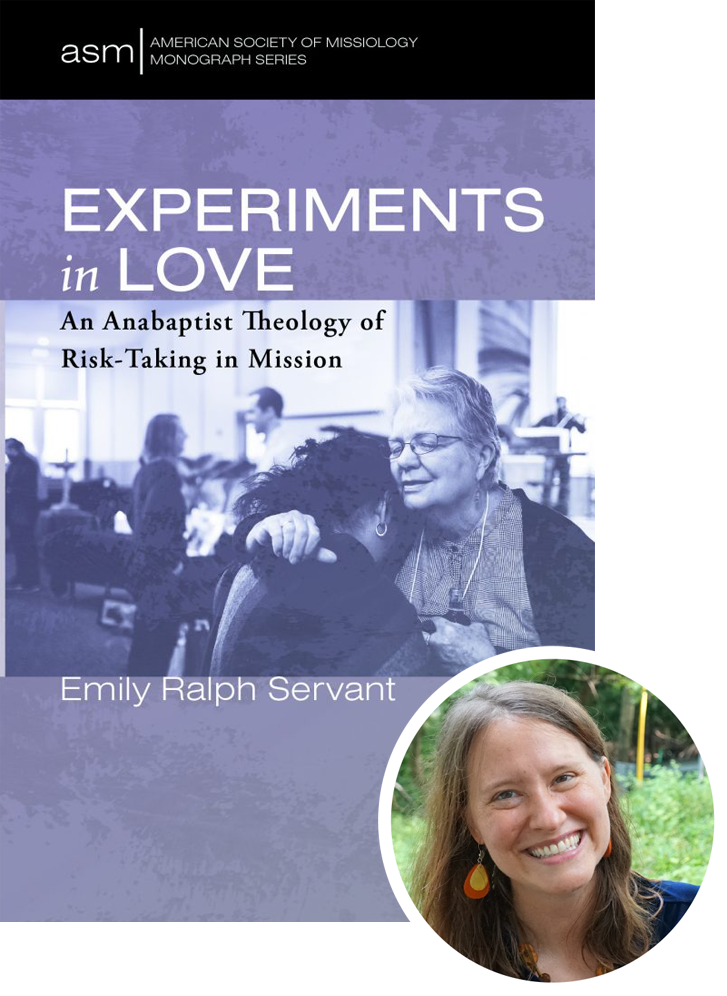
In Experiments in Love, Emily Ralph Servant develops an Anabaptist theology of risk-taking and vulnerability for the purpose of persuading Mennonite churches to be more open to engaging in mission to the people around them. Ralph Servant suggests there is a need to reshape the theological stories told by leaders in churches toward an emphasis on God’s own vulnerability and willingness to risk for us. These new stories, about God and God’s mission, will encourage Mennonite churches to create deeper relationships with others and to more actively participate in mission to those who are different than themselves.
The closed nature of Mennonite communities is well known, and sometimes negatively experienced, by people from the larger society. This is ironic, given the 400 year history of martyrdom for their faith and zeal to persuade others of Anabaptist views and principles.
A copy of Experiments in Love: An Anabaptist Theology of Risk-Taking in Mission by Emily Ralph Servant is available to all interested credentialed leaders of Mosaic Conference. To reserve your complimentary copy, please email the Mosaic office by July 1.
Ralph Servant identifies two causes for this closed culture: a history of persecution producing a bent toward self-preservation, and an emphasis on purity, including “purity of theology, purity of ethics, and purity of witness” (p. 100). The reasons for this cautionary approach to the world have been real enough, but are detrimental now to the mission of the church to the world. “How can Mennonites take risks for the sake of love when we see the world as the enemy and find our identity in standing in opposition to it?” asks Ralph Servant (p. 102). We need to be, as Jesus was, for something, and not just against something (ibid).

Ralph Servant’s book is rich with insights from a wide variety of perspectives, including feminist, liberation, and Black theologies. Anabaptist theology is highlighted, but other Christian traditions are included where relevant. The book is scholarly, well documented, carefully composed, and clearly written. Ralph Servant’s own ability to synthesize these various theologies and to present them to build her case is evident. She concludes that with stories that “reflect new ways of conceiving God, the world, and the Church,” Mennonite churches can dismantle the barriers they have erected between themselves and others, and engage in risk-taking vulnerable relationships that accomplish God’s purposes more effectively.
Not being a theologian myself, I certainly gained much from this book in the way of a survey of multiple theological literatures. Furthermore, I certainly agree with Ralph Servant that the closed character of many Mennonite churches is problematic, and that a willingness to vulnerably engage with others is needed, not only for the benefit of others, but also for the faith development of the church members! Throughout I found myself wondering what the change would look like in actual congregations. In the final pages, Ralph Servant brought up this matter herself and suggested the need for field research on congregational practices, including successful as well as less successful programs and activities.
As an insider/outsider to the Mennonite community of Pennsylvania (I am of Mennonite heritage, but was raised in a missionary family in India, and have attended a wide variety of other denominational churches), I have deeply appreciated Mennonite theology and expression of Christian faith. But I have also been frustrated by the inwardness of Mennonite churches in this area (there are, of course, Mennonite churches all around the world!) Perhaps this book can be a source of theological material for the discussion by church leaders and others on how to overcome that inwardness in favor of openness to God’s Spirit and to the world.

Could it be that the stories we tell in our churches weaken our efforts to be congregations who take risks in mission for the sake of love? In this thought-provoking book, Emily Ralph Servant suggests that the work of today’s leaders is to explore new stories, listen to new voices, and open ourselves up to the Spirit’s work of transformation.
The opinions expressed in articles posted on Mosaic’s website are those of the author and may not reflect the official policy of Mosaic Conference. Mosaic is a large conference, crossing ethnicities, geographies, generations, theologies, and politics. Each person can only speak for themselves; no one can represent “the conference.” May God give us the grace to hear what the Spirit is speaking to us through people with whom we disagree and the humility and courage to love one another even when those disagreements can’t be bridged.
